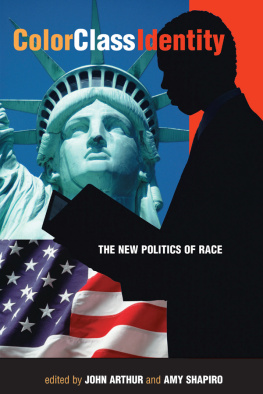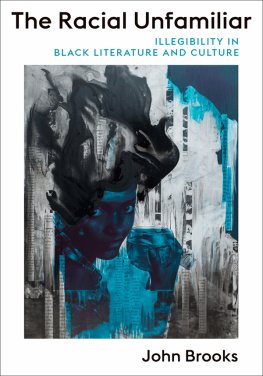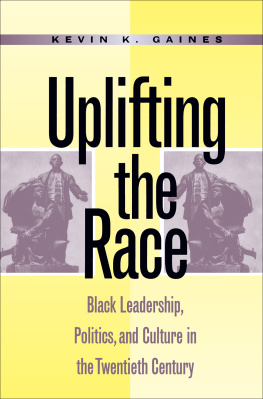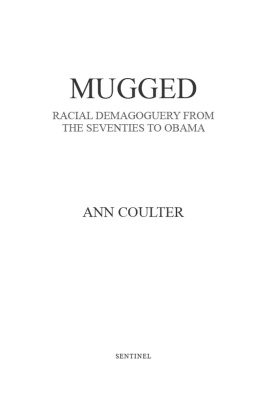Color Class Identity
Color Class Identity
The New Politics of Race
edited by
John Arthur
Amy Shapiro
First published 1996 by Westview Press
Published 2018 by Routledge
711 Third Avenue, New York, NY 10017, USA
2 Park Square, Milton Park, Abingdon, Oxon OX14 4RN
Routledge is an imprint of the Taylor & Francis Group, an informa business
Copyright 1996 Taylor & Francis
All rights reserved. No part of this book may be reprinted or reproduced or utilised in any form or by any electronic, mechanical, or other means, now known or hereafter invented, including photocopying and recording, or in any information storage or retrieval system, without permission in writing from the publishers.
Notice:
Product or corporate names may be trademarks or registered trademarks, and are used only for identification and explanation without intent to infringe.
Library of Congress Cataloging-in-Publication Data
Color class identity: the new politics of race / edited by John
Arthur and Amy Shapiro.
p. cm.
ISBN 0-8133-3114-5 (hardcover).ISBN 0-8133-3115-3 (pbk.)
1. United States?Race relations. 2. Afro-AmericansEconomic
conditions. 3. Urban poorUnited States. 4. Pluralism (Social
sciences)United States. I. Arthur, John, 1946 . II. Shapiro,
Amy, 1952.
E185.615.C645 1996
305.800973dc20
96-14391
CIP
ISBN 13:978-0-8133-3115-7 (pbk)
Contents
, John Arthur and Amy Shapiro
Part One
Thinking Race
, Henry Louis Gates, Jr.
Shelby Steele
, Paul M. Sniderman and Thomas Piazza
, Orlando Patterson
, Glenn C. Loury
Part Two
The Black Underclass
Clarence Thomas
, Patricia J. Williams
, Derrick Bell
Debra Dickerson
, William Julius Wilson
, William Tucker
, Peter Shaw
, Douglas S. Massey and Nancy A. Denton
Part Three
Assimilation and Identity in a Multicultural Society
, W.E.B. Du Bois
, Cornel West
, Laurence Mordekhai Thomas
, Laurie Shrage
, Arthur M. Schlesinger, Jr.
, Ronald T. Takaki
The O. J. Simpson verdict and the beating of Rodney King by white police have forced racial differences once again onto the national agenda as whites and blacks realize how differently they sometimes see the world. In combination with increasingly strident political argument over welfare and affirmative action, these events further underline the differing perspectives and conflicts that some had felt were dissipating. At the same time, we have seen heightened disagreements over multiculturalism in school curricula and the recognition of non-European traditions and cultures as well as growth of interest in issues of assimilation and the importance of group membership (e.g., what it means to be African-American, Jewish, Hispanic, Native American, and so forth).
In this book, we have attempted to bring together the most important and thoughtful writers on these subjects. The book is organized around three themes. Part One focuses on the differences in racial perceptions that have been in evidence in recent political events like the Simpson not-guilty verdict, the Million Man March, and the nomination of black conservative Clarence Thomas to the U.S. Supreme Court. What lessons can be learned about our racial and ethnic divisions from these experiences? Part Two addresses an increasingly explosive topic: the black underclass. Authors consider the nature of the problem, weigh its causes, and evaluate possible solutions. Then, in Part Three, we look at questions of group and individual identity. Here the focus is on the nature of race itself, the importance of ethnicity and race in establishing ones identity, and the political consequences of what some see as a growing tribalism but others see as a belated recognition of the realities of Americas oft-ignored multicultural past as well as its inevitably more diverse and potentially difficult future.
We have sought to achieve a reasonable balance in viewpoints, representing not just one political perspective but including instead a wide array of voices. Authors range from Clarence Thomas, Shelby Steele, and Arthur M. Schlesinger, Jr., to Cornel West, Derrick Bell, Henry Louis Gates, Jr., Patricia J. Williams, and Ronald T. Takaki. Many of the writers are well known, having already made important contributions to these topics; others were chosen because although not as familiar, they also make substantial and unique additions to these discussions. We wish, finally, to thank Spencer Carr for his enthusiasm and good judgment, and the students at the State University of New York at Binghamton who make teaching fun as well as rewarding.
John Arthur
Amy Shapiro
JOHN ARTHUR
AMY SHAPIRO
Two important events in 1995, the O.J. Simpson murder trial and the Million Man March, galvanized Americans attention once again toward questions of race. Many blacks, focusing on sloppy police work and testimony showing racism on the part of an investigating detective, were elated that a biracial jury did not convict one of the most prominent and successful African-Americans in the country. In contrast, a majority of whites were shocked that somebody they believed to be guilty of murder could be set free, apparently in the face of overwhelmingly incriminating evidence. Reactions to the Simpson not-guilty verdict seemed to raise serious questions about how blacks and whites could hope to understand each other while seeing the world so differently.
Within weeks of the trial, hundreds of thousands of black men and boys marched on Washington in the Million Man March, a historic event lauded by some for its emphasis on pride, responsibility, and self-reliance but distrusted by others for excluding women and for the racially charged rhetoric of a prime organizer, Louis Farrakhan. These events of 1995 recalled others in which differing reactions had suggested a deep and growing racial gulf: the beating of Rodney King by white Los Angeles police officers, the harassment charges brought by Anita Hill against Supreme Court nominee Clarence Thomas, and the increasingly divisive arguments about affirmative action and reverse discrimination.
Into this mix must be added explosions of crime, welfare dependency, illegitimacy, and drugs within a significant segment of the African-American population, problems that seem to have grown to gigantic proportions. The statistics are striking: At any given time, about two out of five young black males are either in prison, on probation, or sought by the police; half of all black children live in poverty; and more than two-thirds of black children are being raised by only one parent.1 Concerns about crime have become pervasivea prominent black leader recently reported that one of the saddest moments of his life was when he heard footsteps one night, and then felt relieved to discover that the man coming up behind him was white. Fear of blacks, wrote Norman Podhoretz in 1993, has become the dirty little secret of our political culture. At the same time, he continued, relations between blacks and whites have deteriorated. Gone on the whole are the interracial friendships and the interracial political alliances that were very widespread thirty years ago. In their place we have the nearly impassable gulfs of suspicion and hostility that are epitomized by the typical college dining hall of today where black students insist on sitting at tables of their own and whites are either happy to accept this segregated arrangement or feel hurt at being repulsed.2






